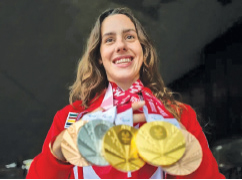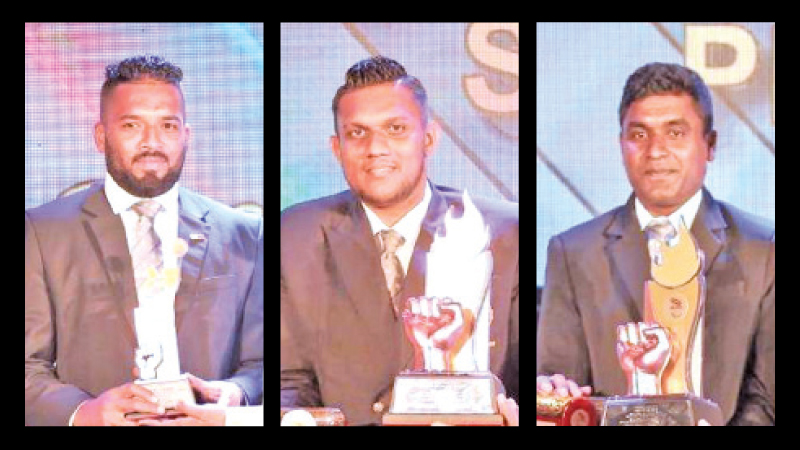 Today, the Paralympic Games are the world’s third biggest sport event in terms of ticket sales; only the Olympic Games and the FIFA World Cup sell more. In 1948, Sir Ludwig Guttmann organized a sports competition involving sixteen World War II veterans with spinal cord-related injuries in Stoke Mandeville, England. Four years later, competitors from Holland joined, and the international movement, now known as the Paralympic Movement, was born.
Today, the Paralympic Games are the world’s third biggest sport event in terms of ticket sales; only the Olympic Games and the FIFA World Cup sell more. In 1948, Sir Ludwig Guttmann organized a sports competition involving sixteen World War II veterans with spinal cord-related injuries in Stoke Mandeville, England. Four years later, competitors from Holland joined, and the international movement, now known as the Paralympic Movement, was born.
Olympic-style games for athletes with a disability were organized for the first time in Rome in 1960. Taking place soon after the conclusion of the Olympic Games, the Olympic-style games for athletes with a disability attracted 400 participants from 23 countries, who competed in eight sports. Taking place every four years in the same year as the Olympic Games, the Paralympic Games have since grown into one of the world’s biggest sport events.
Since the Salt Lake City 2002 Games, one organizing committee has been responsible for hosting both the Olympic and the Paralympic Games. Athletes from both Games live in the same village and enjoy the same catering services, medical care and facilities. Ticketing, technology and transport systems for the Olympic Games are seamlessly extended to the Paralympics.
The Rio 2016 Paralympics attracted 4,328 athletes from 159 countries, who competed in 22 sports. An Independent Paralympic Athletes team featuring two refugee athletes also took part. The Games attracted a record cumulative TV audience of 4.1 billion people in more than 150 countries, while 2.15 million tickets were sold.
The first Paralympic medal in the form of a bronze for Sri Lanka was won by Pradeep Sanjaya in Men’s 400m T46 at London 2012. Then, Dinesh Priyantha secured a bronze medal in Men’s Javelin Throw F 46 at Rio de Janeiro 2016. Then at Tokyo 2020, Sri Lanka’s Dinesh Priyantha won Men’s Javelin Throw setting a new F46 world and Paralympic record of 67.79m. His teammate Dulan Kodituwakku secured a bronze in Javelin Throw F64, with a distance of 65.61.
The Department of Sports Development together with the National Sports Council have selected Sri Lanka’s cream of 25 Para Athletes under the High Performance programme “Road to Paralympics” and they are being afforded all opportunities to take part at the Olympic Qualifiers.
All three Paralympic medalists and other Para Athletes who excelled in Para Games were felicitated befittingly at a grand ceremony held at the Waters’ Edge recently by the President, Colonel Deepal Herath and Secretary, Kanchana Pradeepa de Silva with the Director General of Sports as the Chief Guest.
The first organized athletic event for athletes with disabilities that coincided with the Olympic Games took place on the day of the opening of the 1948 Summer Olympics in London. German-Jewish Ludwig Guttmann of Stoke Mandeville Hospital, who had fled Nazi Germany with the help of the Council for Assisting Refugee Academics (CARA) in 1939, hosted a sports competition for British World War II veteran patients with spinal cord injuries. The first games were called the 1948 International Wheelchair Games, and were intended to coincide with the 1948 Olympics.
Guttman’s aim was to create an elite sports competition for people with disabilities that would be equivalent to the Olympic Games. The games were held at the same location each year, and in 1952 Dutch and Israeli veterans took part alongside the British, making it the first international competition of its own kind. In 1960, the 9th annual games took place outside of the UK for the first time in Rome, to coincide with the 1960 Summer Olympics which were also being held in Rome. These were to be later designated the first Paralympic Games.
Since 1960, the Paralympic Games have taken place in the same year as the Olympic Games. The Games were initially open only to athletes in wheelchairs; at the 1976 Summer Games, athletes with different disabilities were included for the first time at a Summer Paralympics. With the inclusion of more disability classifications the 1976 Summer Games expanded to 1,600 athletes from 40 countries.
The 1988 Summer Paralympics in Seoul was another milestone for the Paralympic movement. It was in Seoul that the Paralympic Summer Games were held directly after the 1988 Summer Olympics, in the same host city, and using the majority of the venues.

Aurelie Rivard,
This set a precedent that was followed in 1992, 1996 and 2000. It was eventually formalized in an agreement between the IPC and the IOC in 2001, and was extended through 2020. On March 10, 2018, the two committees further extended their contract to 2032.
The International Paralympic Committee is the global governing body of the Paralympic Movement. It comprises 178 National Paralympic Committees (NPC) and four disability-specific international sports federations. The president of the IPC is Andrew Parsons. The IPC’s international headquarters are in Bonn, Germany.
Since its creation in 1989, IPC has a cooperative relationship with the IOC. Delegates of the IPC are also members of the IOC and participate on IOC committees and commissions. The two governing bodies remain distinct, with separate Games, despite the close working relationship. Unlike the Olympic Games, English is the official language of the Paralympic movement.
“Spirit in Motion” is the current motto for the Paralympic movement. The current Paralympic flag is used since 2020 and contains three colours, red, blue, and green, which are the colours most widely represented in the flags of nations. The colours are each in the shape of an Agito (which is Latin for ‘I move/I shake/I stir’), which is the name given to an asymmetrical crescent specially designed for the Paralympic movement.
The three Agitos circle a central point, which is a symbol for the athletes congregating from all points of the globe. The motto and symbol of the IPC were changed in 2003 to their current versions. The change was intended to convey the idea that Paralympians have a spirit of competition and that the IPC as an organization realizes its potential and is moving forward to achieve it.
The vision of the IPC is, “To enable Paralympic athletes to achieve sporting excellence and to inspire and excite the world.” The Paralympic anthem is “Hymne de l’Avenir” or “Anthem of the Future.” It was composed by Thierry Darnis and adopted as the official anthem in March 1996.
Paralympic athletes have sought equal opportunities to compete at the Olympic Games. The precedent was set by Neroli Fairhall, a Paralympic archer from New Zealand, who competed at the 1984 Summer Olympics in Los Angeles. In 2008, Oscar Pistorius, a South African sprinter, attempted to qualify for the 2008 Summer Olympics. Pistorius had both his legs a mputated below the knee and races with two carbon fibre blades.
He holds Paralympic world record in the 400m event. Pistorius missed qualifying for the 2008 Summer Olympics in the 400m, by 0.70 seconds. He qualified for the 2008 Summer Paralympics where he won gold medals in the 100m, 200m, and 400m sprints. In 2011, Pistorius qualified for the 2012 Summer Olympics and competed in two events: he made the semi-final in the 400m; and his team came 8th in the final of the 4x400m relay.
Even though all athletes are given equal opportunities to participate in these events, such as the 400m, there has been growing criticism that the games may not be fair to all athletes. For example, athletes running a race with a left prosthetic leg may be disadvantaged compared to those with a right side prosthesis because the races are run in an anticlockwise direction, giving some athletes an advantage.
Some athletes without a disability also compete at the Paralympics; The sighted guides for athletes with a visual impairment are such a close and essential part of the competition that the athlete with visual impairment and the guide are considered a team, and both athletes are medal candidates.
One of Canada’s most successful Paralympians, Aurelie Rivard, shared one piece of advice. Growing up with bullies taunting her every move and too shy to respond, she fought back by swimming faster and faster.
This mixture of helplessness and anger propelled the then 16-year to her first Paralympic medal, a silver at London 2012, which would kick start a dazzling career and prove a turning point in how she thought about herself.
Looking back, the 10-time Paralympic medalist says her journey could have been easier if she had learned to pay less attention to what others thought of her. This is a message she now wants to share with those who are still facing bullies or critics.
Rivard was born with an underdeveloped left hand. Despite growing up with a twin sister who does not have a disability, Rivard says she never felt different and was surprised to hear kids pointing out her hand when she was 12.
“Swimming allowed me to make a path of my own and build my character with something that I was good at and that I loved, as opposed to being in the corner and waiting for the world to pass,” Rivard said, adding that she turned the insults that some classmates hurled at her into extra fuel for training.
In 2012, she found the perfect response to her bullies – a Paralympic medal. Returning home to Quebec with a silver in the women’s 400m freestyle S10, Rivard found the usual group of her tormentors much changed.
Rivard went on to win another four medals at the Rio 2016 Paralympic Games, including three gold, and broke two world records on the way to five medals at Tokyo 2020, which made her Canada’s most successful female Paralympian at the latter edition.






